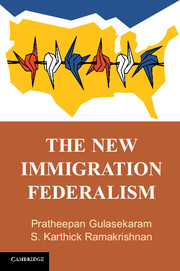Book contents
- Frontmatter
- Dedication
- Contents
- List of Figures and Tables
- Acknowledgments
- 1 Introduction
- 2 Setting the Stage for the New Immigration Federalism
- 3 Rise of Restrictive Legislation and Demographic Arguments of “Vital Necessity”
- 4 A Political Theory of Immigration Federalism: The Polarized Change Model and Restrictive Issue Entrepreneurs
- 5 A Shifting Tide in 2012: Pro-Integration Activists Gain the Upper Hand
- 6 Implications for Legal Theory on Federalism and Immigration Law
- 7 Immigration Federalism Is Here To Stay
- Appendix A Statistical Analysis of Restrictive Local Ordinances
- Appendix B Statistical Analysis of Restrictive State Laws
- Appendix C Statistical Analysis of State Immigrant Integration Laws
- Notes
- Index
6 - Implications for Legal Theory on Federalism and Immigration Law
Published online by Cambridge University Press: 05 November 2015
- Frontmatter
- Dedication
- Contents
- List of Figures and Tables
- Acknowledgments
- 1 Introduction
- 2 Setting the Stage for the New Immigration Federalism
- 3 Rise of Restrictive Legislation and Demographic Arguments of “Vital Necessity”
- 4 A Political Theory of Immigration Federalism: The Polarized Change Model and Restrictive Issue Entrepreneurs
- 5 A Shifting Tide in 2012: Pro-Integration Activists Gain the Upper Hand
- 6 Implications for Legal Theory on Federalism and Immigration Law
- 7 Immigration Federalism Is Here To Stay
- Appendix A Statistical Analysis of Restrictive Local Ordinances
- Appendix B Statistical Analysis of Restrictive State Laws
- Appendix C Statistical Analysis of State Immigrant Integration Laws
- Notes
- Index
Summary
In this chapter, we pivot from answering the “what” and “why” questions of this new immigration federalism, to more fully considering its implications for law and legal discourse. The state and local enactments we described in the preceding chapters are part of a developing new surge of immigration federalism. To recap, the third era of immigration federalism occurred against the backdrop of some major changes in the immigration policy regime: the dismantling of legal temporary worker programs; increased political and legal salience of the line between lawful and unlawful presence; and limiting lawful migration from Mexico and other countries of high immigration. In the immediate aftermath of these changes to the immigration regime, states and localities in the 1970s responded with restrictionist policies, such as excluding undocumented immigrants from employment, erecting barriers for undocumented children attending public schools, and restricting jobs and welfare for noncitizens generally. These policies, in turn, elicited the judicial and academic responses of the late 1970s and 1980s, as courts and commentators attempted to make sense of the rapidly evolving meaning, policy regime, and statutory background of lawful and unlawful migration.
Federal legislative responses to these state and local enactments also took on a different flavor during the third era of immigration federalism. Unlike the prior immigration laws of the twentieth Century, congressional efforts in 1986 and 1996 specifically accounted for the increased presence of states and localities in the regulation of unauthorized migrants. These federal laws responded to subfederal lawmaking and trends, and provided exceptions and opportunities for state and local participation in policies that affected the lives of immigrants. For example, 1986's IRCA expressly addressed several state laws prohibiting the employment of unauthorized workers, preempting those state sanctions (but including a “business licensing” exception that would become significant thirty years later in the Whiting v. U.S. Chamber of Commerce case dealing with Arizona's renewed employer sanctions law enacted in 2007). The federal welfare overhaul in 1996 provided states with the leeway to restrict welfare provision to immigrants – even some lawfully present immigrants – in ways they could not before. Concurrently, the 1996 immigration overhaul provided opportunities for state and local enactments to benefit unauthorized migrants, including provisions for in-state tuition benefits and professional licensing.
- Type
- Chapter
- Information
- The New Immigration Federalism , pp. 151 - 194Publisher: Cambridge University PressPrint publication year: 2015



